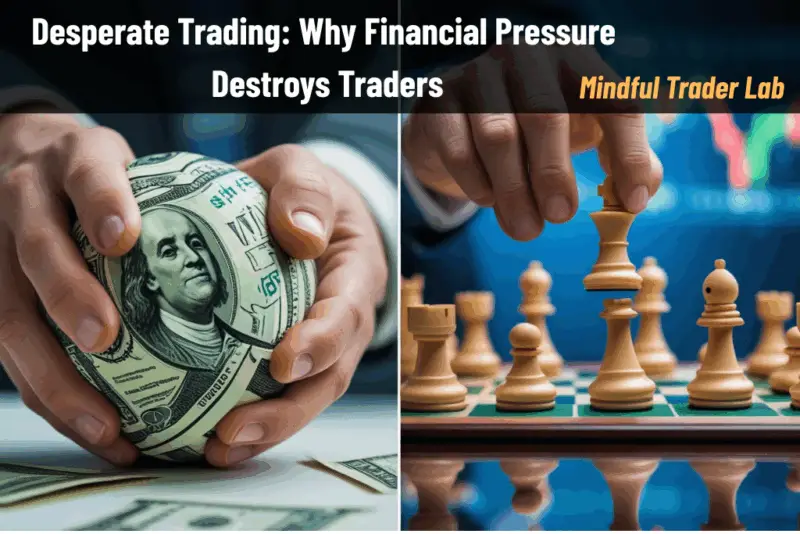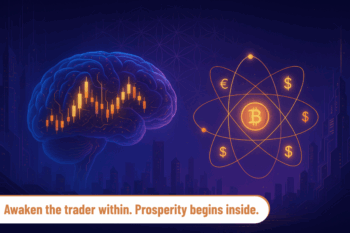Desperate Trading: Why Financial Pressure Is the Worst ‘Setup’

Did it happen to you too?
The credit card bill hits, rent is overdue, and suddenly trading feels like your only lifeline. You stumble upon a guru promising “quick returns” or selling a course to “make extra cash.” You open a broker account with money you couldn’t afford to lose… it all seems easy and exciting at first. You look at frozen charts and think:
“Just buy before it goes up or sell before it drops — how hard can it be? I’m gonna get rich!”
Two weeks later, your balance vanishes.
Here’s a harsh truth nobody likes to talk about:
Starting your trading journey under financial pressure is like trading with a gun to your head.
Your brain flips into survival mode and kills any chance of consistent profitability.
And the worst part?
That’s exactly how most people first discover trading — in moments of crisis.
Yes, trading can indeed transform your life.
But only if you approach it with awareness, deep study, and inner transformation.
And during this journey, it’s vital to have another source of income while you build skills. Let me explain why.
How the Brain Actually Works
Put simply:
Your brain needs space to absorb knowledge and process decisions — like a computer running on RAM.
Now imagine trying to run a high-performance app on a device overloaded with heavy files. It crashes.
That’s what happens inside your mind when you’re emotionally overloaded.
Fear of failure, fear of lack, guilt, emotional bonds with family — these are all “heavy files” clogging your mental system. They blind you to logic and sabotage your technical focus.
That’s why beginner traders lose money.
Can You Start Trading Out of Financial Need and Still Succeed?
Let’s look at the fatal traps:
Trading to pay rent → constant anxiety
Comparing yourself to “gurus” → chronic FOMO
Ignoring risk, underestimating the market → account blown in a week
“I just need to make it until my next paycheck” → Panic-driven trading
Rushing trades to escape your job → strategy with blindfolds
Risk? “I’ll just go all in — if it fails, I’ll figure it out later.”
→ Result: massive losses that make things even worse.
Real Mentorship Case:
Let me share a real case (J.E.), whose story might sound familiar.
He discovered trading during a personal crisis.
He was mentally and physically drained working 12-hour shifts in a factory — a job he no longer resonated with. He was sick, deep in debt, suffering from anxiety, sinus issues, and desperate to escape.
He turned to the internet looking for answers.
That’s when he found a so-called “guru” — more skilled in marketing than actual trading. J.E. fell for the illusion. He believed trading was an oasis in the desert.
But starting trading like this only deepened his emotional crisis. He lost confidence. He fell into an identity crisis. He came to me after losing almost 50% of his severance pay trying to “win back” his life.
Here’s what we did to turn it around:
1. Emotional Detox and Deep Healing
We began by addressing emotional roots — trauma, family patterns, unconscious dynamics (we’ll explore this more in a future article).
2. Reconstructing Identity
We had to dismantle the identity society gave him — the “average worker mindset.”
Beliefs like:
“I have to be productive”
“I need to make money”
No!
You don’t need to “make money.”
You need to be technical and strategic.
Money is a consequence.
Focus on what gives you strength and clarity — that’s where your power lies.
3. Systemic Discipline
We worked on discipline outside of trading.
You can’t expect to be disciplined in front of a chart if your life is a mess.
Be a better parent. Be more honest. Be a better human.
Your true character always shows up in the market.
4. Eliciting Core Values
This is a true metanoia.
If you don’t know your core values, you can’t protect them.
And if you don’t protect them, life (and the market) will crush you.
People lie to themselves.
They stay in toxic relationships, endure meaningless jobs.
That kind of identity won’t survive the markets.
But J.E. did the work.
He applied the methods, rebuilt his foundation, and his trading results flipped — from rock bottom to total transformation.
Exclusive Mentorship Exercise: What Are Your Core Values?
Don’t answer yet.
Let me explain what a “value” truly means — especially in the context of Time Line Therapy (TLT).
Values are like invisible motors driving our decisions.
They shape everything — how we react, what we pursue, and even how we handle wins and losses in the market.
Before you ever hit “buy” or “sell,” your values are already active.
They are the why behind your trading goals.
You might say you want financial freedom — but maybe what you really seek is security, freedom, or recognition.
When you lack clarity about your values, self-sabotage takes over.
You’ll emotionally “prostitute” yourself, abandoning your true self for short-term gains.
Values Guide Our Decisions
Even when you’re unsure whether to hold or close a position — your values are what tip the scale.
If you value safety, you might skip high-risk trades.
If you crave freedom, rigid plans might feel suffocating.
Psychologist Milton Rokeach described values as deep-rooted beliefs about what’s desirable in life.
They shape how we judge our trading performance — whether we feel like winners or failures.
So Here’s the Exercise (TLT-Based Value Elicitation):
Ask yourself:
“In my professional life, what is truly important to me right now?”
Don’t answer from your head. Ask inward.
Feel the answer in your heart — not the ideal values, but your real current ones.
Ask several times. You’ll uncover multiple values.
They come in two main forms, and they exist in a hierarchy (we’ll cover that in a future post).
Two Main Value Forms:
Avoidance Values: Subconscious patterns trying to protect you.
→ “Avoid pain,” “Don’t fail,” “Don’t be hurt.”
This is why some traders delay stop-losses — they subconsciously avoid the emotional pain of being wrong.Approach Values: Aspirations pulling you forward.
→ “Win,” “Grow,” “Have freedom,” “Build wealth.”
Both are useful. But if I had to choose one — I’d go with approach values.
Why?
From a quantum energy perspective, avoidance values usually carry fear-based vibrations.
Approach values are energized by enthusiasm and clarity.
But both are still emotional — and must be channeled into behavior: discipline, strategy, and risk management.
You don’t trade the market.
You trade your beliefs.
And your beliefs are rooted in your values.
If your trading journey began in desperation, it’s not the end —
it’s the beginning of a deeper, more meaningful transformation.
Comment below with your opinion on the matter.
💎 Achieve emotional excellence in your negotiations, subscribe to our list, stay informed now and increase your profits! Read also: How to control emotions in negotiations!




Be the first to comment!